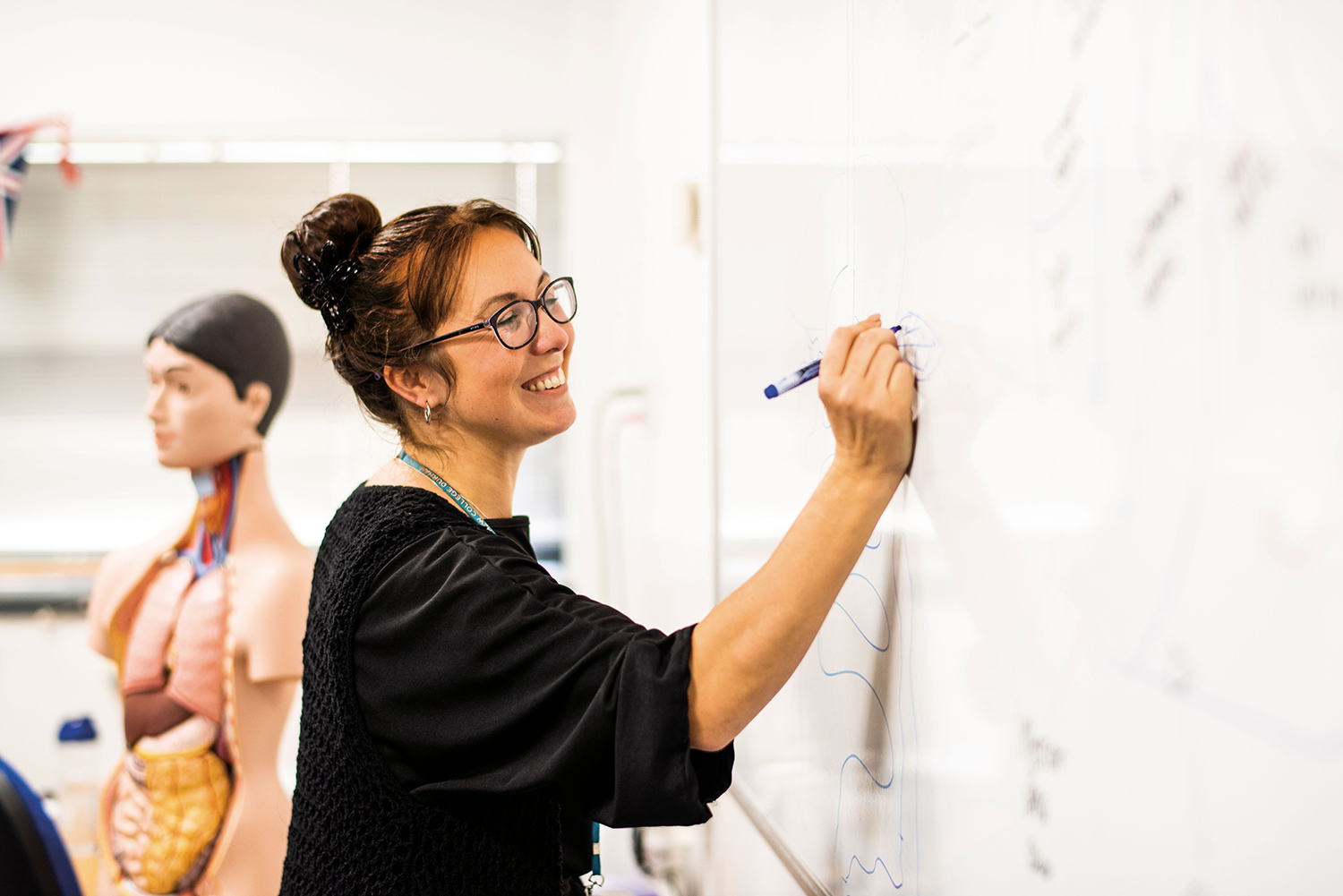
Course details may be subject to change and programme is subject to validation.
The FdSc Leadership Principles in Health & Social Care is continually being reinvented to reflect the dynamic nature of the health and social care sectors and will help you get your foot on the leadership or management ladder.
This programme provides a challenging, employability led curriculum relevant to the needs of the student that reflects the current and projected needs of the local Health and Social Care sector in the North East of England and beyond.
Entry Criteria
Admissions Criteria
Standard Entry requirements:
The following admissions criteria will normally apply at Level 4:
-
Students applying for this programme will be a minimum age of 18 years old and are expected to hold a relevant Level 3 qualification in a related subject with a minimum of 64 UCAS points (A level, BTEC).
-
Applicants should hold 4 GCSE qualifications at grade 4 or above and include maths and English Language. Due to the nature of the award, applications will be reviewed on an individual basis and, if a student does not hold GCSE maths or English, there will be a recommendation that they work towards achieving such qualifications, whilst studying on the FdSc programme. The recommendation to continue studies of maths and English is to support future progression within the sector, where holding such qualifications will be an essential requirement. Please note this may be an additional cost to the student.
-
All applicants will be expected to apply for, or hold a valid ‘Enhanced DBS’, which may be a cost to the student. The timeline for students to apply for a DBS will be by the end of the third week, following commencement of the programme.
- All applicants must be interviewed by the curriculum team, where applicants live substantially away from the college, this can be conducted over live video chat / Teams / Zoom.
Non-Standard Entry Requirements (including Mature students):
Mature students (aged at least 21 by 31st December of the year of admission) or applicants with non-standard qualifications and/or experience and whose qualifications and/or experience is deemed to be appropriate to gain entry onto a named foundation degree may be admitted onto a foundation degree programme.
Such admission is discretionary and will normally involve an interview. In appropriate cases such applicants may be asked to undertake assessment activity to assist the College in determining their suitability for the programme.
Additional Costs
You will not be required to make any compulsory additional purchases, however, it is advised you consider investing in the recommended study materials.
What are the next steps?
All applicants must be interviewed, on-site, by the curriculum team. Applicants will be invited to attend NCD University Centre to complete the interview process. Where applicants live substantially away from the college, this can be conducted over live video chat / Teams / Zoom.
Study Aims
The aims of the FdSc Leadership Principles in Health & Social Care are to:
-
Provide students with an academic and vocationally oriented curriculum that establishes a firm understanding of the concept of Health and Social Care in a contemporary society.
-
Allow students to develop a comprehensive understanding of leadership theories, principles, and practices within the context of health and social care settings.
-
Provide opportunities for students to explore contemporary issues, trends, and innovations shaping the landscape of health and social care leadership.
-
Cultivate ethical leadership practices that prioritise the well-being and dignity of service users, staff members, and communities.
-
Meet employer demand for higher level qualified practitioners who are compassionate and critically reflective.
-
Enable students to develop their academic, personal, and professional potential into employment within the local and regional health and social care sector.
- Enhance students understanding and application of the ‘6C’s of Health and Social Care – Compassion, Care, Competence, Communication, Courage, and Commitment.
Modules Studied
At Level 4, students will study the following modules:
- Personal Professional Development (PPD)
- Work Related Learning: Professional Values and Principles in HSC
- Anatomy, Physiology & the Exploration of Health Conditions
- Working with People
- Understanding Teamwork & Collaborative Practices
- Legislation, Policy & Ethical Practices
At Level 5, students will study the following modules:
- Inquiry and Innovation in HSC Research
- Continued Professional Development for Lifelong Learning
- Principles of Leadership & Management in HSC
- Public Health
- Transforming Health and Social Care
Times of Delivery
At Level 4 current timetables are as follows and students are expected on-site:
Monday - 9am - 4pm Tuesday - 9am - 4pm
Any times indicated are based on current courses and may be subject to change in future years. Full timetables will be confirmed at the start of each course
Any times indicated are based on current courses and may be subject to change in future years. Full timetables will be confirmed at the start of each course.
Teaching and Assessment
You will be allocated a personal tutor on commencement of the course, who will oversee your progression and provide pastoral support as required. In addition to support from your personal tutor, you will receive academic support from module tutors, if required. You can also request additional guidance from HE Academic Support to help them with your studies and gain access to a Personal Learning Coach, if needed.
A variety of summative assessment methods are used across the study programme to enable you to demonstrate your knowledge and skills. You will develop the skills required to present your understanding and research coherently. This could include the following:
Multi Choice Examination Reports Presentations Professional discussions Peer reviews Case studies Discussions Viva Written assignments
You will complete an assessment for each module, as a vehicle to assess key and transferable skills and learning outcomes. Assessments are mapped to learning outcomes.
Industry Links
The programme was designed with significant support and engagement with key local employers and organisations to ensure a current, valid and exciting curriculum. Employers and speakers will be an essential part of the curriculum and provide students with guest speaker support, working projects and workshop opportunities.
To give a wider experience of the health and social care sector, the programme offers opportunities for students to engage in a range of sector visits, which are an important and distinctive feature that allow the students to engage, learn and broaden their understanding of the complexities of the sector.
Placement
Due to the nature and volume of students who may study the FdSc Leadership Principles in HSC, across ������Ƶ�� Durham and partner sites (HEIs) there will be ‘no mandatory’ requirement to attend and complete a work-based placement. However, tutors will encourage students, who are not actively employed within the sector (P/T), to pursue suitable opportunities and volunteering experiences to support the development of social, personal and employability skills. Such examples could be residential, community domiciliary and day care services, with adults, children, individuals with learning or physical difficulties and those experiencing mental health issues. Such experience will expand the relevancy of vocational experience to the classroom learning, helping relate theory to practice.
What else?
This is a newly validated programme and provides an exciting, current and challenging curriculum, with strong links and connections with local employers and service providers.
NCD offer outstanding facilities on site which include The Technical and Higher Education Hub with state of the art immersive technologies and environments in hospital, dental, optical and domiciliary care settings.
The intended progression pathway for students completing the FdSc is direct to the BSc Health & Social Care (Top-up) at ������Ƶ�� Durham.
Some examples of alternative pathways may include:
- BA (Hons) Management (Top-up) at ������Ƶ�� Durham
- Nursing Associate Higher Apprenticeship
- Alternative Top-up degree programmes with external providers
- Direct progression to employment within the sector.
Examples of some of the employment progression pathways, include:
- Management and Leadership roles in the sector
- Head of section
- Project support leads
- Team leader
- Educational leader
- Finance management
- Clinical manager
- HR/ Practice manager
- Bid managers
- Community care worker
- Health support worker
- Health care assistant
- Alternative Top-up degree programmes with external providers
- Direct progression to employment within the sector


